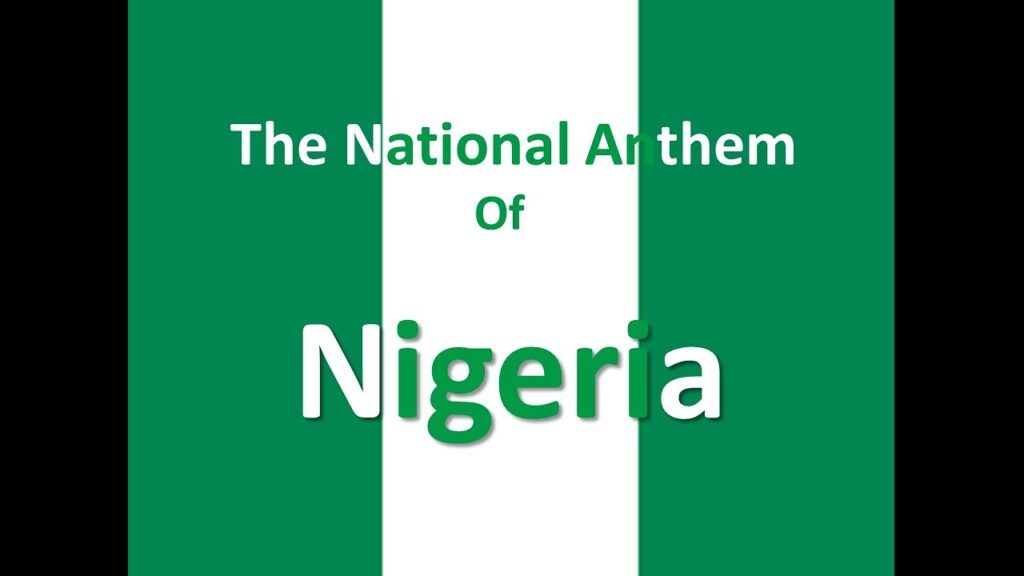In the heat of untold hardship on Nigerians, what’s the significance of a National Anthem? On Thursday, a bill proposing that Nigeria revert to its old national anthem, ‘Nigeria, We Hail Thee,’ passed its third reading at the House of Representatives and its second reading in the Senate. It left many Nigerians pondering the importance of a National Anthem.
The old one, remembered fondly by some as “Nigeria We Hail Thee” was adopted in 1960 upon Nigeria’s independence. The anthem’s lyrics were written by Lillian Jean Williams, a British expatriate who lived in Nigeria when it achieved independence. While the music was composed by Frances Berda, it speaks to a country that though made up of different tribes, ethnic groups and religions, stands as one indivisible nation. Its reign lasted 18 years. In 1978, Nigeria changed its national anthem to “Arise, O Compatriots” under the military administration of General Olusgeun Obasanjo.
The anthem was originally written as a poem by five different writers, and a former police officer. Benedict Odiase, who served in the Nigeria Police Force from 1954 to 1992 was also the Music Director of the Nigerian Police Band. He was tasked with turning the poem into an anthem.
“Arise, O Compatriots” promotes national ownership, as the composer of the previous anthem was a British expatriate.
But those who support the old anthem argue that it carries a historical significance and a sense of nostalgia that could inspire a renewed sense of patriotism among Nigerians. They believe that reinstating the old anthem might rekindle a collective memory of the country’s foundational aspirations and unity.
However, critics are skeptical about the effectiveness of such a symbolic gesture in addressing the profound economic and social challenges currently facing the nation.
The speed with which the bill is racing through its readings at the National Assembly suggests it will be passed into law soon, but how many people can remember or even sing it.
Whichever way the decision goes, this is a discussion that has left many Nigerians pondering if reverting to an old national anthem can indeed translate to tangible improvements in their daily lives with the country facing rising unemployment, inflation, and insecurity.
That the old anthem is coming back, decades after, is proof that the work of the committee, made up of eminent and distinguished Nigerians, could not stand the test of time. Curiously, and in that frenzied haste, the critics of that song forgot that the same woman gave Nigeria the name she bears till date. They also did not take time to listen to the lyrics that, in our opinion, conveyed a grasping patriotic fervour that is clearly lacking in the one that is replacing it.
Media reports indicate that the House of Representatives have already passed the bill while it has passed the second reading in the Senate. As a newspaper, we commend the lawmakers for initiating the process of bringing back a beautiful song of a nation trashed, unnecessarily, on the basis of inexplicable emotion devoid of critical thinking. But that is where the commendation ought to end.
As the critics of the legislative move pointed out, this is not the time to indulge in such flights of fancy. Not at a time Nigerians are expecting their representatives to make laws that add value to their lives. They expect legislation that brings about, in practical terms, growth and development and, also, presents the country to the international community as a nation serious in its approach to governance with utmost interest in the welfare of the citizens.
The question on the lips of most Nigerians since the diversionary legislative process commenced is, what next? It is important to observe that on the scale of priority, national anthem, as important as it is, pales in relevance to a people bugged down by the hassles of daily survival, in a situation where the ruling elite preach austerity just as they indulge in mindless bohemian libertinage.
The 10th National Assembly is almost one year old. Since coming into office, and in terms of impartation on the life of the people, what is their record? Nigerians have the impression that it is about the worst since 1999. They point to the security situation in the country and the unbridled menace of bandits, kidnappers and terrorists. Progressively, agriculture, in the country, is locked in a deadly struggle with enemies of society as farmers cannot go to their farms for fear of being abducted or even killed. The sad effect of this development is that the prices of food items are hitting the roof as the prospect of mass hunger looms so large.
Nigerians also point out the high cost of living among the ordinary folks and the concupiscence that is the lifestyle of the political elite. When they are not buying exotic cars for themselves, they are embarking on frivolous holidays that question their commitment to the duty of making laws for good governance of the nation.
The National Assembly looks on as the average Nigerian is squeezed daily for one form of tariff or the other. They hide their heads in the sand as services, as essential as electricity and fuel, are recklessly taken out of the reach of the fabled common man. The lawmakers stand unperturbed as youths, the engine room of growth of any nation, wallow in disaster-laden unemployment. They feel nonplussed as foreign investors flee the country and local enterprises close shop because of the harsh business environment.
Our political leaders, in particular, the lawmakers should beam their lights in formulating laws and programmes that will grow the economy rather than contemplating on irrelevant things. There is still no headway to the national minimum wage as of today. It is very obvious that meditating on the national anthem now is a misplaced priority considering the severe hardship on Nigerians.

